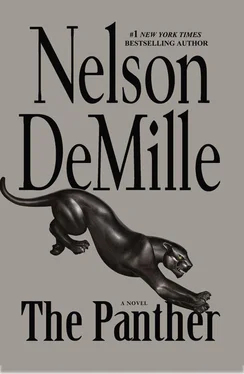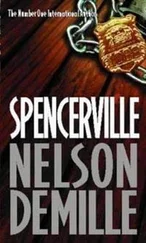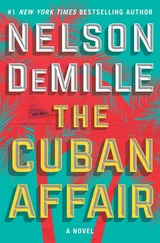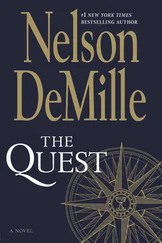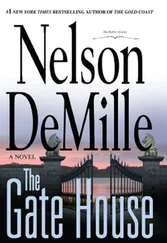Nelson Demille - The Panther
Здесь есть возможность читать онлайн «Nelson Demille - The Panther» весь текст электронной книги совершенно бесплатно (целиком полную версию без сокращений). В некоторых случаях можно слушать аудио, скачать через торрент в формате fb2 и присутствует краткое содержание. Жанр: Триллер, на английском языке. Описание произведения, (предисловие) а так же отзывы посетителей доступны на портале библиотеки ЛибКат.
- Название:The Panther
- Автор:
- Жанр:
- Год:неизвестен
- ISBN:нет данных
- Рейтинг книги:5 / 5. Голосов: 1
-
Избранное:Добавить в избранное
- Отзывы:
-
Ваша оценка:
- 100
- 1
- 2
- 3
- 4
- 5
The Panther: краткое содержание, описание и аннотация
Предлагаем к чтению аннотацию, описание, краткое содержание или предисловие (зависит от того, что написал сам автор книги «The Panther»). Если вы не нашли необходимую информацию о книге — напишите в комментариях, мы постараемся отыскать её.
The Panther — читать онлайн бесплатно полную книгу (весь текст) целиком
Ниже представлен текст книги, разбитый по страницам. Система сохранения места последней прочитанной страницы, позволяет с удобством читать онлайн бесплатно книгу «The Panther», без необходимости каждый раз заново искать на чём Вы остановились. Поставьте закладку, и сможете в любой момент перейти на страницу, на которой закончили чтение.
Интервал:
Закладка:
The size of an embassy staff is classified, but I’ll say we had three bartenders, and six Yemeni men passing hors d’oeuvres. Hopefully, the Marines or the Diplomatic Security Service had checked them all out for suicide belts.
None of the Marines were in attendance, except for the two officers, a captain, and a young lieutenant who told me he’d served in Afghanistan. I asked him, “Would you rather be here or Afghanistan?”
He replied without hesitation, “Afghanistan,” explaining, “There you know you’re in a combat zone, and so does everyone around you. Here, everyone around you-the civilians-pretend there’s no war, and that’s dangerous.”
“Right.” Which was probably not much different than the mind-set in the presidential palace and the government ministries. Except now and then, reality intruded into the deep bunkers of denial.
I looked around at the embassy people, who were nicely dressed, sipping cocktails and chatting. This could have been anywhere in the civilized world, including New York. But outside the guarded walls was another world that had absolutely nothing in common with this world. Except, to be optimistic, a shared humanity, a love of children and family, a hope for peace, prosperity, health, and happiness, and a belief in a higher being who was loving and kind-except when he got pissed off and sent plagues and floods to get rid of everyone.
Kate was making the rounds, getting to know her new colleagues, who actually would never see her again. I chatted with people who came up to me and welcomed me to Yemen. Everyone seemed to know I was going to Aden with the FBI Evidence Response Team, and that my stay in Sana’a would be short. Interestingly, no one wanted to know anything about the Cole investigation. I think the dips put a distance between themselves and those men and women who used the cover of the embassy for other kinds of work.
Among those who did that kind of work was the military attache, a.k.a. the Military Intelligence officer, who introduced himself to me as Colonel Drew Kent, U.S. Army, a tall, middle-aged man in mufti. His job here, he informed me, was challenging, but fulfilling. A few minutes later he modified that a bit and said, “The Yemeni Army is a friggin’ joke. The unwilling led by the incompetent. Ill-paid, ill-equipped, ill-trained, and unmotivated.”
“But are they good?”
He thought that was funny and advised me, “If you need to depend on them to provide security for your work-whatever it is-make sure you watch your back and sleep with your boots on and your gun handy. Better yet, stay awake.”
I asked him, “How about the National Security Bureau?”
“You mean the blue clowns? Half police force, half tourist protection service, and all corrupt. They don’t have a clear mission or a clear chain of command. They’re used and abused by the politicians to further their own agendas. If you need to rely on them for security, make sure you pay them well-half up front, half if you get back alive.”
I hoped Matt Longo knew all that. I inquired, “How much is well?”
“About two dollars per man, per day. Extra if they have to fire their rifles.”
“Sounds reasonable.”
He informed me, “The blue clowns did a disappearing act on a bunch of Belgian tourists last August. At the Marib ruins.”
“Really? What happened to the tourists?”
“They disappeared, too. Maybe kidnapped, but no one has heard from them.”
“I hope they’re all right.”
“Don’t bet on it. Their Yemeni guide and their bus driver were found with their throats slit.”
Ouch. I didn’t remember hearing about this, but bad news out of Yemen wasn’t big news in the States unless it had to do with Americans. I mean, I’d been surprised to discover there were over a hundred Westerners kidnapped in the last ten years, mostly Europeans. Now and then you’d hear about tourists being killed, sometimes in a crossfire between Yemeni security forces and tribal kidnappers. But what Colonel Kent was describing didn’t sound like a tribal kidnapping.
I asked him, “Could that have been an Al Qaeda attack?”
“That seems to be the consensus. But the Yemeni government plays down these incidents.” He let me know, “They like the tourism. In fact, tours still go to the Marib ruins.”
“How many come back?”
On the subject of Marib as an exciting place, Colonel Kent said, “There was an Al Qaeda attack last night on the Hunt Oil installation north of Marib.”
“I heard.”
“Did you?” He continued, “Hunt hires its own security force-mostly American and European mercenary types. Unfortunately, the NSB insists on being in on the arrangement-for money, of course. But as I said, you can’t trust them, so when the excrement starts to fly, you don’t know if the NSB has your back, or if they ran away, or if they joined the other team.” He concluded, “Tactically, it’s a damned nightmare.”
“Right. But the Al Qaeda guys were routed.”
“Luck. Or maybe the Hunt guys knew they were coming. Information is cheaper than a barrel of oil around here.” He added, “Maybe the Al Qaeda force was inept.”
I thought of Rahim and partly agreed. But I was also sure that the Al Qaeda guys were going to get better.
Colonel Kent said to me, “They got an Al Qaeda prisoner from the attack.”
I didn’t respond, so he asked me, “You know about that?”
“You know I do and that’s all I can say.”
He accepted that and advised me, “The Agency always knows more than they’re saying. If you’re FBI, which I guess you are, you’ll get more help from my office-Military Intelligence-than you’ll get from our Comrades In Arms.”
“Right.”
“And be aware that State Department Intelligence cozies up to the CIA more than they should.” He opined, “SDI should be working more with MI.”
Who’s on first? Anyway, Colonel Kent seemed to be a man of opinions, so I asked him, “What’s your opinion of the Political Security Organization?”
He replied, “Like any internal political security force, they can be nasty. In most countries in the Mideast, they’re called the Mukhabarat, which they were once called here. But that name has a lot of negatives attached to it-like the old KGB or the Gestapo-so they changed the name here. But it’s the same bunch of thugs. And as in every other dictatorship, people are frightened of them and people think they’re everywhere. Truth is, they’re not, but they promote fear and distrust.” He advised me, “Steer clear of them if you can. They answer to no one except the president and his inner circle.”
I wondered if they were hiring-or did I really want to be a warlord? Anyway, I asked Colonel Kent, “Do you know this PSO guy, Colonel Hakim?”
“Sure. Nasty thug. But not stupid.”
“Whose side is he on?”
“He’s on his side. He wants to keep his job and his high status no matter who wins. He’ll shoot an Al Qaeda captive one day, then let another one escape another day. He does the same with the tribal rebels. But someday he’s going to get a bullet in the head from one side or the other.”
I wouldn’t mind doing that myself. I asked him, “Who’s going to win here? The government, the al-Houthi rebels, the South Yemen separatists, or Al Qaeda?”
“Well… in the end, the tribes always win-if they can agree on a leader. This al-Houthi guy may be the one. There’s another one-a Bedouin sheik-in Marib who could unite the tribes. If not, I’d put my money on Al Qaeda.”
“Why?”
“Because they’re organized, disciplined, and they believe they are the future.”
“They’re the past.”
“That is the future.”
“Right.”
Then he said to me, sotto voce, “If you’re here to find The Panther, I wish you luck. But I’ll also tell you that it might be best in the long run if Al Qaeda won in Yemen.”
Читать дальшеИнтервал:
Закладка:
Похожие книги на «The Panther»
Представляем Вашему вниманию похожие книги на «The Panther» списком для выбора. Мы отобрали схожую по названию и смыслу литературу в надежде предоставить читателям больше вариантов отыскать новые, интересные, ещё непрочитанные произведения.
Обсуждение, отзывы о книге «The Panther» и просто собственные мнения читателей. Оставьте ваши комментарии, напишите, что Вы думаете о произведении, его смысле или главных героях. Укажите что конкретно понравилось, а что нет, и почему Вы так считаете.
